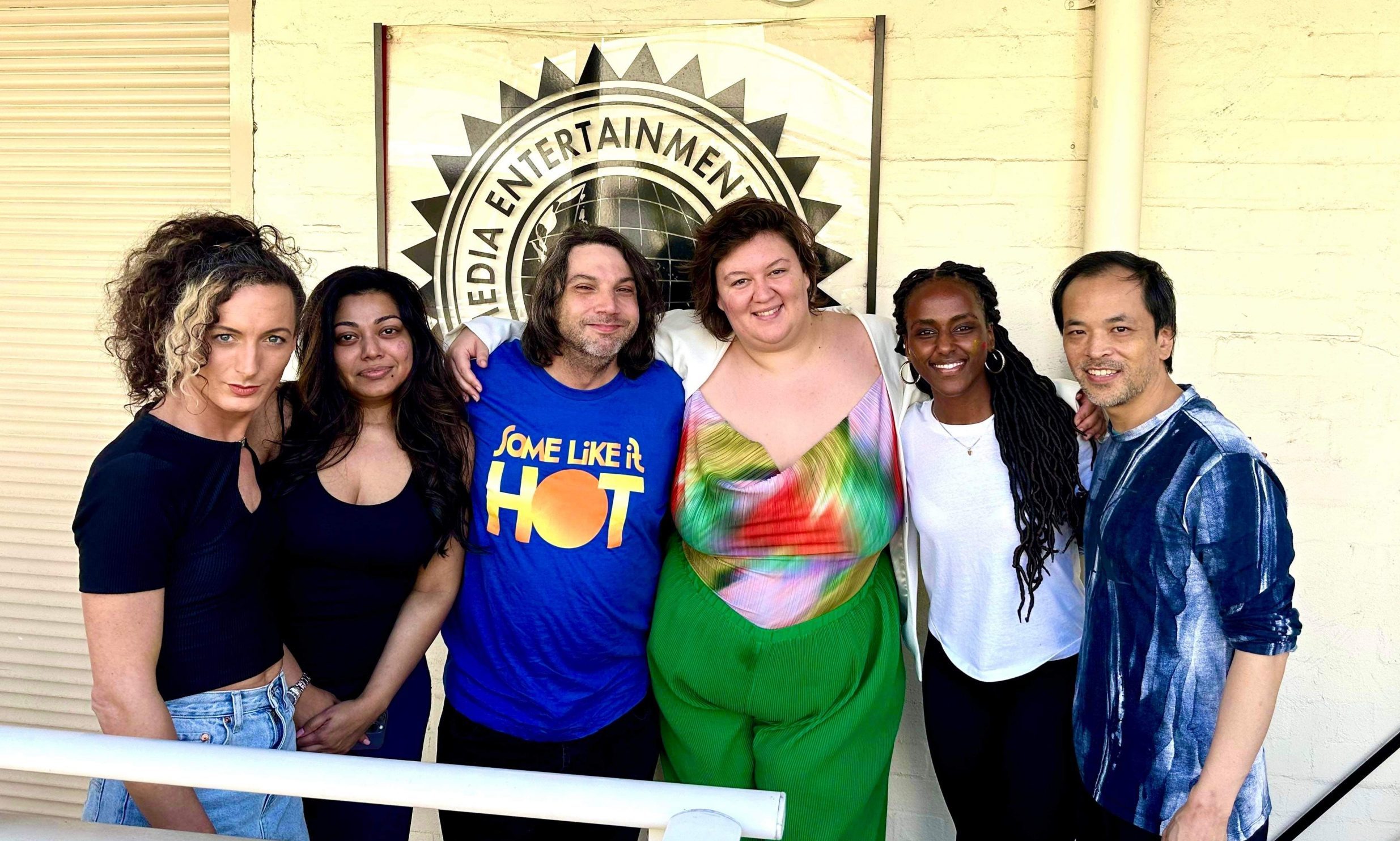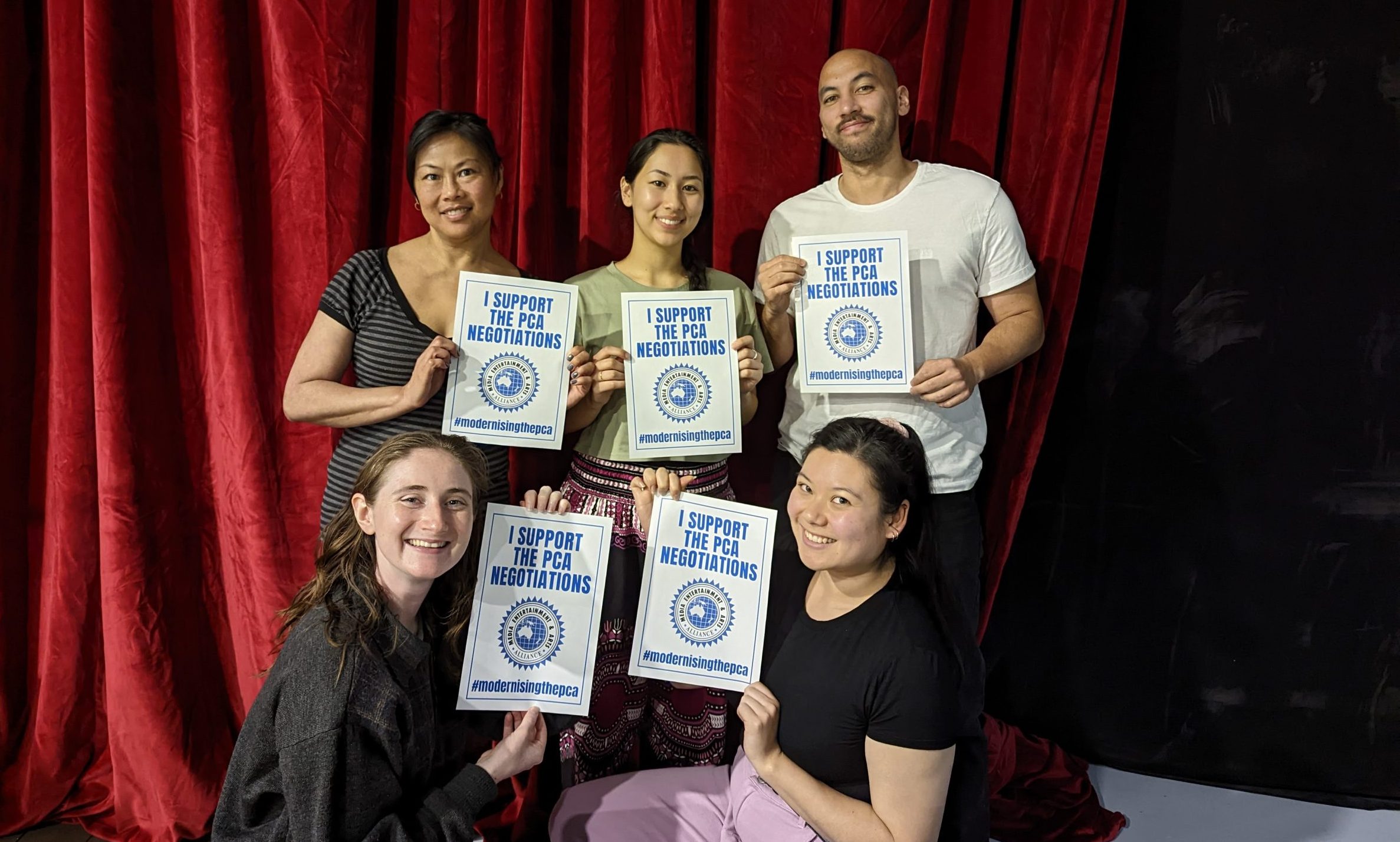2022-23 Equity Section report
By Michelle Rae, Director, MEAA Equity
Dancers from The Australian Ballet gathered together ahead of industrial action for the first time in several decades in June.
In 2022-23 MEAA Equity worked with government, employers, agents and activist members to build respect and value for performers and their industry, deliver strong wages growth, access to job opportunities for those who have been historically under-represented, and improve performers’ mental health and wellbeing; while also providing access to free professional development and community initiatives via the work of the Equity Foundation.
Dancers pivot to further industrial action
In 2023 MEAA Equity members at The Australian Ballet stood together and voted No to an offer from management that would have threatened their financial security.
The strong No vote (79.4% of 68 participating dancers) sent a clear signal to management that dancers would not accept a deal that removed an important provision in their collective agreement that keeps their wages in line with CPI increases.
During COVID lockdowns, dancers at the Australian Ballet took voluntary pay cuts and wage freezes to help support the company.
As negotiations stalled, dancers shared their extreme cost-of-living pressures with management and the public and voted overwhelmingly in favour of protected industrial action for the first time in more than four decades. Dancers held the curtain twice in June and July before Melbourne performances, attracting widespread and favourable national media coverage. The dancers have received overwhelming support from the community with more than 2000 people sending an email to management at The Australian Ballet demanding they listen to the dancers’ concerns.
Negotiations and industrial actions were paused while the dancers tour London and with plans to resume and escalate on their return.
SAG-AFTRA strikers in for long haul
Both US writers and actors’ unions went on strike in 2023 for the first time since 1960. Actors, like writers, are calling for better wages, fair compensation in the streaming TV era, and safeguards regarding artificial intelligence.
The outcome of these strikes will have far-reaching impacts for performers worldwide, including in Australia. Australian actors involved in screen productions with imported SAG-AFTRA members in lead roles including Mortal Kombat and Apples Never Fall experienced production delays, resulting in unpaid leave in some instances.
MEAA Equity has publicly conveyed solidarity with SAG-AFTRA. Their struggle is our struggle and a win in Hollywood will set the standard for improvements for screen performers around the world. MEAA Equity is regularly in communication with SAG-AFTRA regarding contracting issues and interim agreements resulting from the strike.
Performers push for a real pay rise amid cost-of-living crisis
The collective agreement that sets performers’ minimum pay and conditions for most theatre work in Australia, the Performers Collective Agreement (PCA), is still being renegotiated with producers. This is the first time in more than four years that the agreement has been renegotiated.
While there has been some progress on our claims, such as cultural leave provisions, annual pay rises have not been agreed. At meetings nationwide, MEAA Equity members resolved they would not accept a below inflation pay rise that would be completely swallowed by personal margins. More than 750 performers signed an open letter urging producers to improve their offer.
Equity Diversity Committee members at the MEAA offices in Sydney.
AI regulation ‘a matter of urgency’
The rapid advancement and distribution of AI — in particular, generative AI — holds remarkable promise for societies, businesses and individuals, but also poses unique threats to our members’ work, income, rights and creative agency, and to the continuation of Australian voices in a sustainable media and entertainment industry. The speed at which these technologies are evolving means that any necessary framework or regulation ought to be developed as a matter of urgency.
In a submission to an Australian government inquiry into safe and responsible artificial intelligence, MEAA flagged concerns about the unique threats generative AI poses to our members’ work, income, rights and creative agency. MEAA is calling for a regulatory framework to be developed as a matter of urgency so implementation of AI in Australia does not infringe on copyright and privacy, contains informed consent, and correctly recognises the original owners and creators of content. Responsibly designed AI has the potential to enhance the work of our members and to benefit audiences. But there must be mechanisms to minimise the risks.
Access and Inclusion
Equity’s campaigning and industrial efforts included a strong focus on creating an inclusive, accessible and safe industry and more opportunities for First Nations people, people of colour, the disabled, chronically ill, neurodivergent, trans, non-binary, and/or gender diverse and senior artists.
The Equity Diversity Community (EDC) has set a goal to be all of union (rather than just performers) and to that end it has expanded to include crew. The EDC has grown from 380 to 790 members in the past 12 months and continues to drive and inform MEAA’s campaign and advocacy work.
The EDC will launch their Represent Campaign in November 2023 to increase representation on stage and screen, behind the scenes and fighting for cultural safety, inclusion and access for all workers.
The cast of the State Theatre Company South Australia production of Single Asian Female were one of many that showed their support for the Performers Collective Agreement campaign during the 2022-23 year.
Pay rise for TV and radio voice-over work
The minimum pay rates for commercial voice-over work increased by more than 5%, following MEAA’s negotiations with the Advertising Council Australia in September 2022. This rate rise includes an increase on the submission rate (now up to $200) across the board on all recordings. During negotiations MEAA also established a mechanism for increases to occur each year with CPI so that voice-over artists are not left behind with inflation and all performers are compensated fairly for their work. The Advertising Council Australia endorsed the increase and advised their producer members of the changes.
Netflix local content quota on the horizon
At present, our streaming platforms have no obligation to invest in Australian stories. While some streamers are providing Australian content without regulation, this is not true of all them and their voluntary engagement is vulnerable to changes in management and content strategy. Australian content on our screens should not be at the gift of global businesses, but instead a firm, consistent and certain regulatory obligation.
For the last six years — via the Make It Australian campaign — MEAA, Screen Producers Australia, Australian Writers’ Guild and Australian Directors’ Guild have lobbied vigorously for streamers to be required to invest 20% of their Australian revenue in making new Australian stories. Our position is based on precedent in comparable countries like Canada and France, who recognise the need to balance local stories with those from other countries and cultures.
Following the election of the Albanese Labor Government and the release this year of the National Cultural Policy, we now have a concrete timeline for the delivery of an investment obligation for more Australian stories on streaming platforms by July 2024. As expected, the streamers are pushing back and seeking to minimise their obligations, so we cannot rest until these necessary reforms are in place, and if they fall short of expectations, then the campaign will go on.


